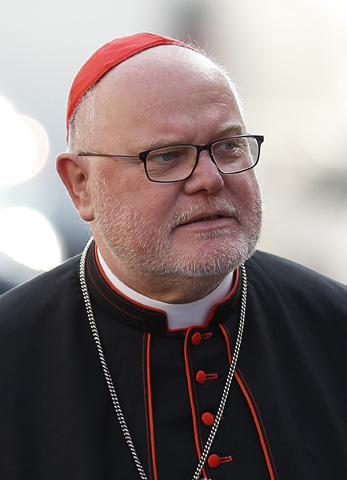
Cardinal Reinhard Marx of Munich and Freising, Germany, coordinator of the Vatican's Secretariat for the Economy, arrives for the opening session of the extraordinary Synod of Bishops on the family at the Vatican in this Oct. 6, 2014 file photo. (CNS/Paul Haring)
The fact that Pope Francis has simplified annulment procedures is a "sensible" signal which the German bishops welcome, but it should not be seen as a step in anticipation of the coming Synod of Bishops on the family, said German Cardinal Reinhard Marx, the president of the German bishops' conference, at a press conference Sept. 8 in Berlin.
"It is a sensible signal but it does not solve the fundamental problems," Marx said. For many people who had maybe been married for 20 years, "annulment is a foreign word." Simplification of the annulment procedures is only a partial solution of marriage breakdown and the desire for a second marriage, he said.
Marx does not think that the synod bishops would decide to change canon law. "There will be no valid second sacramental marriage," he said, but the church must make quite clear that people whose marriages had failed still belonged to the church.
The cardinal said that Catholic teaching on marriage was by no means outdated. The majority of people still hope for a life-long marriage and are open to children. The church must encourage this model of marriage and not only consider the possibility that it would fail. Marx said he hopes that the Synod's message would be that lifelong marriage "is possible, but if you fail, we will stand by you."
The synod's purpose, however, is to find common solutions to family problems in the world church, he said. German Catholics should not expect their views to be adopted by the world.
The new Archbishop of Berlin, Heiner Koch, who is responsible for family affairs in the German bishops' conference and will be accompanying Marx to the Synod, is concerned that German Catholics will be disappointed by the outcome of the synod. He has spoken to many bishops on his visits abroad and said that views on family issues differ widely.
In Germany, opinions on certain points are often sharply divided. Reading and answering the hundreds of emails Koch received on the coming synod, which had meanwhile become "almost a full-time job," show how "irreconcilable" people are on certain issues. One email said, "Surely you won't betray Catholic teaching and tradition?", while another said, "You surely won't betray people for the sake of doctrine?"
Expectations of the synod are too high, Koch said. Family issues are being linked to "mega issues such as the understanding of the Eucharist, the issue of church authority and its limits and the question of the definition of marriage," issues which go beyond pastoral issues. Koch said he doubted whether a three-week Synod could get through quite such a large workload. "It would have been better to limit the number of topics up for discussion," he said.
Meanwhile, Congregation for the Doctrine of Faith Prefect Cardinal Gerhard Müller has sharply attacked the German church's claim to be world leaders on moral and sexual issues, saying it is responsible for "the present climate in the church" and warning of a possible schism.
In Regensburg Sept. 1 to present the German edition of Cardinal Robert Sarah's new book God or Nothing – A Conversation on Faith, Müller accused German church leaders of trying "by hook or by crook" to deconstruct and relativize Catholic teaching on marriage "in order to make it seem that it conforms with society," despite the fact that an ever higher number of German Catholics are leaving the church and that its confessionals, seminaries and religious institutions are "empty."
"We must not deceive people as far as the sacramentality of marriage, its openness for children and the fundamental complementarity of both sexes are concerned," Müller said.




